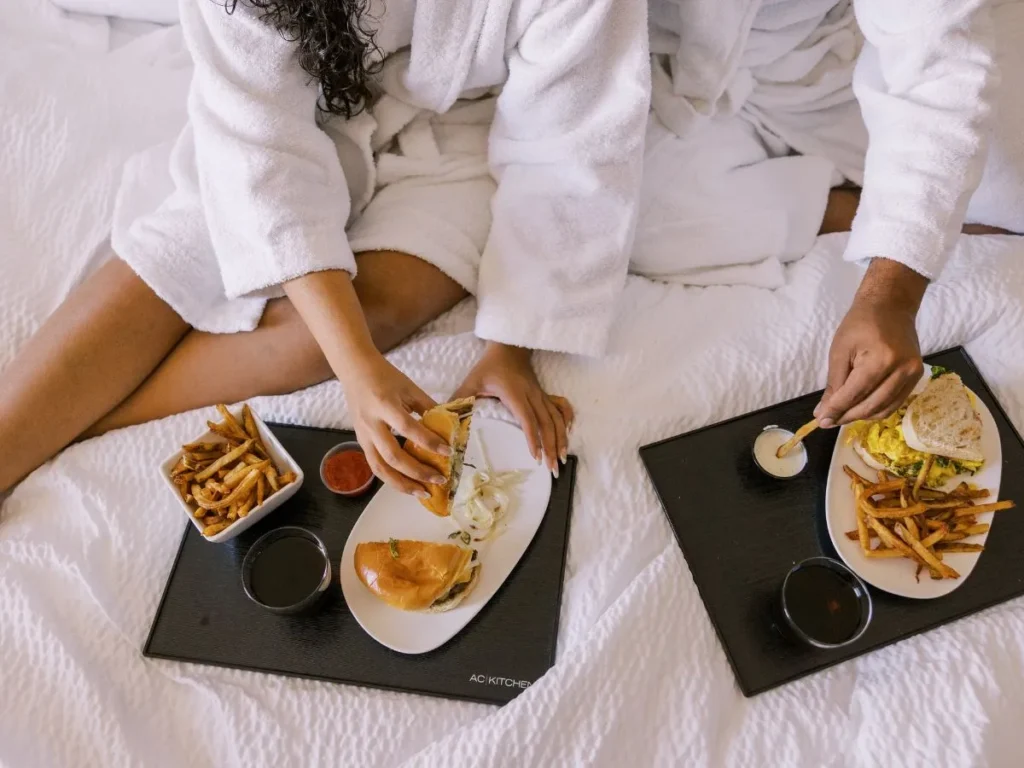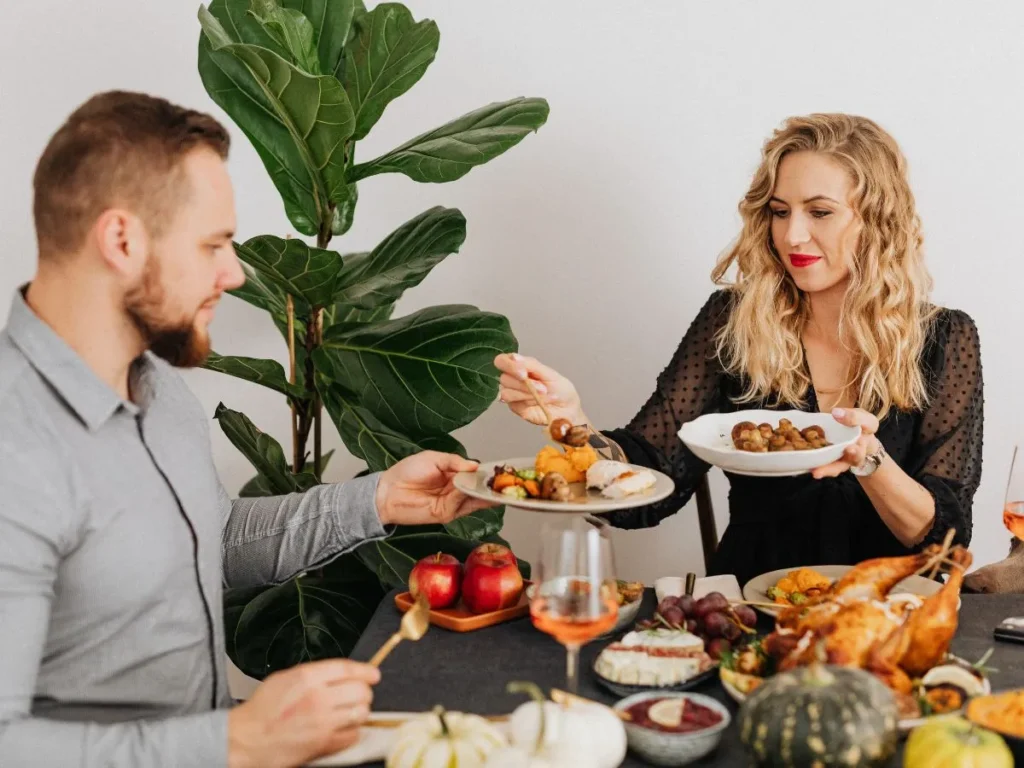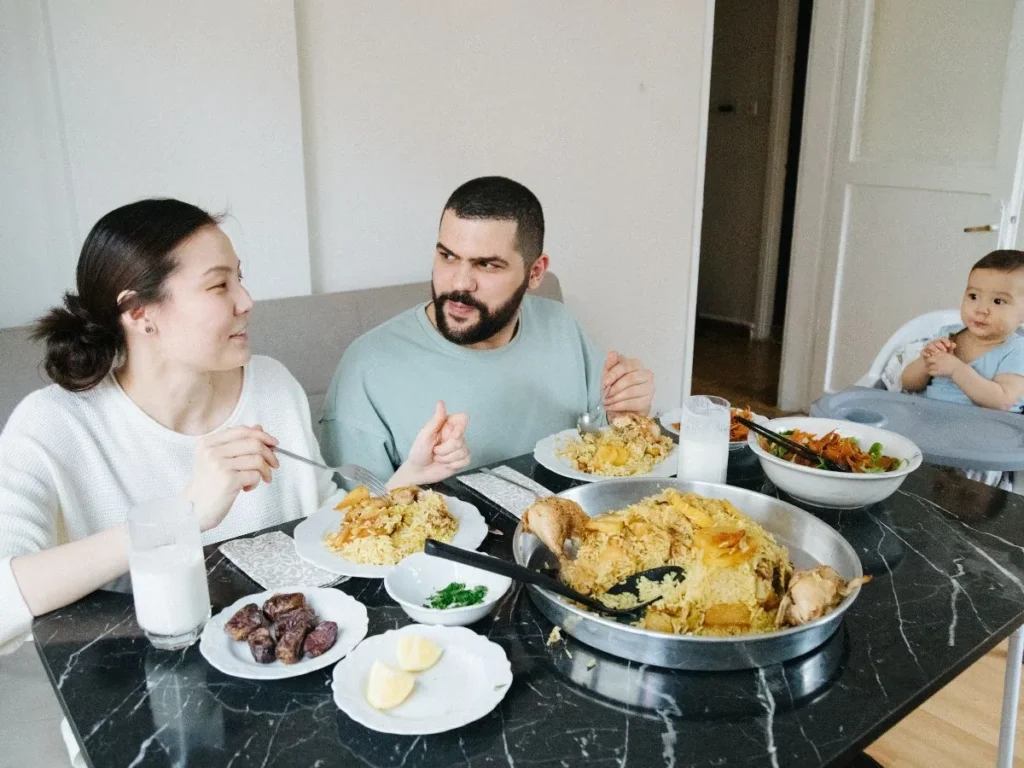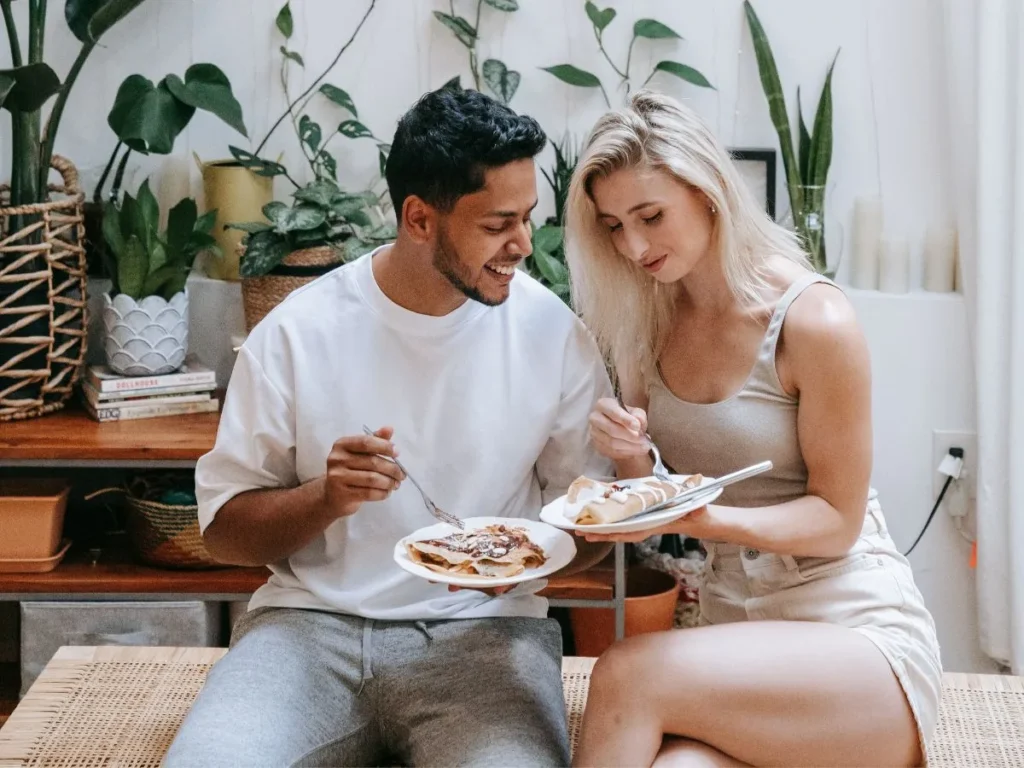Are you tired of the age-old question, “What do you want to eat?” only to be met with a shrug of uncertainty from your significant other? You’re not alone. Many couples find themselves in the familiar predicament of indecision when it comes to dining choices. Picture this: it’s Friday night, and you and your girlfriend are eager to unwind and enjoy a nice meal together. But as you sit down to discuss dinner plans, you’re met with a familiar refrain: “I don’t know, what do you feel like?”
This scenario is all too common for couples navigating the world of dining decisions, and it can be particularly frustrating when my girlfriend never knows what she wants to eat. It’s not that she’s intentionally being difficult; rather, she genuinely struggles to make decisions about food. Whether it’s due to an overwhelming array of options, fear of making the wrong choice, or simply not having a strong preference, her indecisiveness can put a damper on what should be an enjoyable dining experience.
But fear not, for there are ways to navigate this challenge and strengthen your dining experiences together. In this article, we’ll delve into the issue of indecisiveness in dining choices, with a specific focus on the perspective of having a girlfriend who struggles to make decisions about food. We’ll explore the psychology behind this phenomenon, examine potential reasons for her indecisiveness, and offer practical strategies for overcoming it.
The aim of this article is not to criticize or place blame but rather to provide insights and solutions for couples who find themselves grappling with this common issue. By understanding the root causes of indecisiveness and adopting effective communication strategies, you can transform dining dilemmas into opportunities for connection and growth in your relationship.
So, if you’ve ever found yourself frustrated by your girlfriend’s indecisiveness when it comes to food choices, you’re in the right place. Together, we’ll explore strategies and insights to help you navigate this challenge and create memorable dining experiences that strengthen your relationship as a couple. It’s time to turn “My Girlfriend Never Knows What She Wants To Eat” into “Let’s try something new and exciting together.”

My Girlfriend Never Knows What She Wants To Eat: Understanding the Psychology of Indecisiveness
It’s common to be unable to decide what to eat because of different psychological factors that affect decision-making. To solve the problem successfully, you need to understand these basic dynamics.
The Paralysis of Choice
One prominent aspect contributing to indecisiveness is the abundance of options available in today’s culinary landscape. With an array of restaurants, cuisines, and menu items to choose from, individuals may feel overwhelmed by the sheer variety. This phenomenon, known as the paradox of choice, can lead to decision paralysis, where a person struggles to make a selection when faced with too many options. This dilemma is all too familiar when my girlfriend never knows what she wants to eat, as the vast array of choices can leave her feeling unsure and hesitant.
Fear of Making the Wrong Choice
Another psychological factor that fuels indecisiveness is the fear of making the wrong choice. Dining experiences are often associated with pleasure and satisfaction, and no one wants to end up with a meal they dislike or regret. This fear of disappointment can create pressure to choose the perfect option, leading to indecision and hesitation. When my girlfriend never knows what she wants to eat, this fear may be heightened as she strives to ensure a positive dining experience for both herself and her partner.
Decision Fatigue
Throughout the day, individuals make numerous decisions, both significant and trivial. This constant decision-making can deplete mental resources and lead to decision fatigue, where individuals experience a decline in their ability to make choices effectively. By the time mealtime arrives, one’s decision-making capacity may be compromised, resulting in indecision and reliance on others to make dining choices. This exhaustion from decision-making can be particularly pronounced when my girlfriend never knows what she wants to eat, as the burden of choosing falls on her partner, adding to their frustration and impatience.

Examining Potential Reasons for Indecisiveness
When exploring why some individuals, including girlfriends, may struggle with making food decisions, several factors come into play.
Overwhelm from Options
For some individuals, the sheer number of dining options can be overwhelming. With an abundance of restaurants, cuisines, and menu items available, making a decision can feel like navigating a maze of choices. When My Girlfriend Never Knows What She Wants To Eat, this may be magnified as she grapples with the multitude of possibilities and their potential outcomes.
Desire for Satisfaction
There is a natural desire for satisfaction and enjoyment from the dining experience. Individuals want to select a meal that they will enjoy and find fulfilling. People who want to have a good eating experience may not be able to make decisions because they are afraid of making the wrong choice. When my girlfriend never knows what she wants to eat, this desire for satisfaction may lead to heightened indecisiveness as she seeks to avoid disappointment and uncertainty.
External Pressures
External factors, such as societal expectations or pressure from peers, can also influence dining decisions. Individuals may feel compelled to choose certain foods or dining establishments to conform to social norms or expectations. When my girlfriend never knows what she wants to eat, these external pressures may add an additional layer of complexity to her decision-making process, further contributing to her indecisiveness.
Impact on Relationships
The frustration and impact on relationships, when one partner is indecisive about dining options, can be significant.
Communication Breakdowns
Repeated indecisiveness can lead to communication breakdowns between partners. The inability to make a decision may result in frustration and tension, affecting the quality of communication and connection within the relationship. When my girlfriend never knows what she wants to eat, these communication breakdowns may become more pronounced as the issue of indecisiveness becomes a recurring source of conflict and frustration.
Diminished Spontaneity
Indecisiveness in dining choices can hinder spontaneity and adventure in the relationship. Instead of embracing new culinary experiences, couples may find themselves stuck in a rut, opting for familiar choices or defaulting to the same few eateries. When my girlfriend never knows what she wants to eat, this lack of spontaneity may be particularly evident as the couple struggles to break free from the cycle of indecision and routine.
Strained Dynamics
Over time, unresolved tensions and resentments can strain the dynamics of the relationship. The constant back-and-forth over dining options can create distance between partners, overshadowing the enjoyment of spending time together. When my girlfriend never knows what she wants to eat, these strained dynamics may escalate as the frustration and resentment surrounding her indecisiveness begin to erode the foundation of the relationship.

Communication and Compromise
Effective communication and compromise are essential components of addressing the challenge when my girlfriend never knows what she wants to eat. By fostering open dialogue and finding common ground, couples can navigate the complexities of dining decisions and strengthen their relationship bonds.
Importance of Open Communication
The cornerstone of addressing indecisiveness in dining choices is open communication. By openly discussing preferences, concerns, and expectations, couples can better understand each other’s perspectives and work together to find mutually satisfying solutions. When my girlfriend never knows what she wants to eat, it’s crucial to create a safe space for honest conversation, free from judgment or criticism.
Strategies for Constructive Conversations
Initiating constructive conversations about dining preferences can be challenging, especially when one partner struggles with indecision. However, by employing effective communication strategies, couples can navigate this issue without causing conflict.
One approach is to approach the topic with empathy and understanding. Acknowledge your partner’s struggles with decision-making and express your desire to find solutions together. Avoid placing blame or becoming defensive, as this can escalate tensions and hinder productive communication.
Another strategy is to frame the conversation in a positive light, focusing on the shared goal of enjoying a satisfying dining experience together. Instead of dwelling on past frustrations or failures, focus on finding proactive solutions and exploring new possibilities.
Additionally, consider setting aside dedicated time to discuss dining plans and preferences. By setting up regular check-ins, couples can deal with any problems or worries before they become fights. This method helps set up a regular way to talk to each other and stresses how important it is to work together as a team.
Value of Compromise and Finding Common Ground
In addressing indecisiveness in dining choices, compromise plays a vital role in finding common ground. Instead of viewing dining decisions as a battleground for conflicting preferences, couples can approach them as opportunities for mutual understanding and compromise.
One effective strategy is to explore alternative dining options that cater to both partners’ preferences. For example, if one partner enjoys Asian cuisine while the other prefers Italian, consider choosing a restaurant that offers a multiple menu with options for both preferences. This allows both partners to enjoy their favorite dishes while also trying something new and exciting together.
Another approach is to take turns choosing restaurants or cuisines. By alternating decision-making responsibilities, couples can ensure that both partners have a chance to express their preferences and explore their culinary interests. This approach promotes fairness and equality in dining choices, reducing the likelihood of resentment or frustration.
Furthermore, be willing to explore the middle ground and compromise on specific dining preferences. If one partner has a strong preference for a particular restaurant, be open to accommodating their choice, even if it may not be your first preference. Similarly, encourage your partner to try new foods or dining experiences that they may be hesitant about, fostering a spirit of adventure and exploration in your relationship.

Creative Solutions for Overcoming Indecisiveness in Dining Choices
Dealing with the challenge of my girlfriend never knows what she wants to eat can be frustrating. Still, it also gives an opportunity for couples to explore creative solutions and enhance their dining experiences together. By thinking outside the box and embracing new approaches, couples can overcome indecisiveness and inject excitement into their culinary adventures.
Trying New Cuisines and Exploring Themed Restaurants
One effective strategy for overcoming indecisiveness is to explore new cuisines and themed restaurants. Instead of getting stuck in a rut of indecision over familiar options, couples can broaden their horizons by sampling cuisines from around the world or immersing themselves in unique dining experiences.
Consider scheduling themed dining nights where you and your partner take turns choosing a cuisine or restaurant theme to explore. Whether it’s indulging in sushi at a Japanese izakaya or savoring the flavors of Spain at a tapas bar, themed dining nights can add an element of incitement and adventure to your culinary repertoire.
Additionally, don’t be afraid to step outside your comfort zone and try dishes you’ve never experienced before. Exploring unfamiliar cuisines can be a fun and educational journey, allowing you to discover new flavors and expand your palate together.
Benefits of Meal Planning and Creating Dining Options in Advance
Another strategy for overcoming indecisiveness is meal planning and creating a list of potential dining options in advance. By taking a proactive approach to dining decisions, couples can alleviate the stress of last-minute indecision and ensure a more enjoyable dining experience.
Start by setting aside time each week to plan your meals and dining outings together. Collaborate on creating a list of restaurants or cuisines you both want to try, taking into account each other’s preferences and dietary restrictions. Having a predetermined list of options to choose from can streamline the decision-making process and reduce the likelihood of indecisiveness.
Meal planning can also help couples save time and money by avoiding impulse dining decisions or excessive takeout orders. By preparing meals at home or scheduling dine-out nights in advance, couples can make more mindful choices about where and what to eat, leading to a more satisfying dining experience overall.
Tips for Exploring Diverse Dining Experiences Together
In addition to trying new cuisines and meal planning, there are several tips couples can employ to explore diverse dining experiences together.
First, prioritize communication and compromise when making dining decisions. Be open to each other’s suggestions and preferences, and be willing to explore new dining options that may be outside your comfort zone.
Second, embrace spontaneity and be open to trying new restaurants or dishes on a whim. Keep an open mind and be willing to step outside your culinary comfort zone, as spontaneity can lead to unexpected and delightful dining experiences.
Finally, make dining out a shared adventure by researching restaurants together, reading reviews, and discussing potential dining options. By actively involving both partners in the decision-making process, couples can foster a sense of partnership and collaboration in their dining experiences.

Understanding Individual Preferences
In the journey of addressing the challenge when my girlfriend never knows what she wants to eat, understanding and embracing individual food preferences plays a pivotal role. Partners can strengthen their bond and improve their dinner experiences together by pushing each other to explore their cooking interests and creating an atmosphere of mutual respect and experimentation.
Encouraging Exploration of Individual Food Preferences
One of the first steps in navigating indecisiveness in dining choices is encouraging couples to explore their individual food preferences. There are different tastes, cooking experiences, and safety zones when it comes to food for each person. Embracing these differences can make the eating experience better.
Encourage open dialogue about favorite foods, cuisines, and dining experiences. Take turns sharing stories about memorable meals or culinary adventures from the past. Couples can learn more about what foods make their partner feel good and why by carefully listening to each other’s tastes and experiences.
Respecting Each Other’s Tastes and Preferences
While exploring individual food preferences is important, it’s equally crucial to respect each other’s tastes and preferences. If two people have different tastes in food, that should be seen as a chance to learn and grow, not as something to fight about.
Discuss the significance of respecting each other’s dietary choices, whether it’s due to personal preferences, cultural background, or health considerations. Avoid passing judgment or imposing your own food preferences onto your partner. Instead, strive to create a supportive and non-judgmental environment where both partners feel free to express their culinary preferences without fear of criticism or ridicule.
Encouraging Experimentation and Adventurous Eating
In addition to respecting each other’s tastes and preferences, couples should also encourage experimentation and adventurous eating.
Suggest exploring new restaurants or cuisines that neither partner has tried before. Take advantage of opportunities to attend food festivals, cooking classes, or cultural events that expose you to different culinary traditions. It can be interesting to try new foods and cuisines with your partner. It can also help you make memories.
Creating a Supportive Environment for Expressing Preferences
Finally, it’s important to create a supportive environment where both partners feel comfortable expressing their dining preferences openly and honestly. Encourage each other to communicate their likes, dislikes, and dietary restrictions without fear of judgment or criticism.
Practice active listening and empathy when discussing dining choices. Be receptive to your partner’s suggestions and be willing to compromise when making decisions about where and what to eat. Remember that dining preferences may evolve over time, so be open to revisiting conversations about food preferences periodically to ensure that both partners’ needs are being met.

Embracing Spontaneity
In the realm of dining choices, embracing spontaneity can breathe new life into the experience, especially when my girlfriend never knows what she wants to e
Advocating for Spontaneity and Flexibility
One of the keys to overcoming the challenge of indecisiveness in dining choices is to advocate for embracing spontaneity and allowing for flexibility. Instead of getting bogged down by indecision or sticking to rigid plans, couples can seize the moment and embrace the unexpected when it comes to dining decisions.
Encourage your partner to let go of the need for certainty and control when it comes to dining choices. Emphasize the joy and excitement that come from embracing spontaneity and being open to new experiences. By fostering a mindset of flexibility, couples can create opportunities for memorable dining adventures that are spontaneous and unpredictable.
Excitement and Adventure in Trying New Restaurants or Dishes
One of the greatest thrills of embracing spontaneity in dining decisions is the sense of excitement and adventure that comes from trying new restaurants or dishes on a whim. Instead of sticking to familiar favorites or routine dining routines, couples can embark on culinary journeys that are full of surprises and discoveries.
Discuss the thrill of stumbling upon a hidden gem of a restaurant while wandering the streets of a new city or the joy of trying a dish you’ve never heard of before on a whim. Emphasize the sense of anticipation and delight that comes from stepping outside your culinary comfort zone and embracing the unknown.
Personal Stories Highlighting the Joys of Spontaneous Dining Experiences
Share personal stories or experiences that highlight the joys of spontaneous dining experiences with a partner. Whether it’s time you stumbled upon a quaint café while exploring a new neighborhood or the impromptu picnic you enjoyed in the park with takeaway sushi, these anecdotes serve as reminders of the magic that can happen when you let go of rigid plans and embrace spontaneity.
Reflect on the laughter, conversation, and sense of connection that accompany spontaneous dining adventures with your partner. Recall the moments of serendipity and surprise that have enriched your relationship and created lasting memories. By sharing these stories, you inspire others to embrace spontaneity in their own dining experiences and savor the joy of living in the moment.

Patience and Understanding
When faced with the challenge of my girlfriend never knows what she wants to eat, patience and understanding are essential virtues to cultivate. By emphasizing the importance of empathy, offering strategies for remaining calm during moments of frustration, and encouraging couples to view dining decisions as opportunities for growth and connection, partners can navigate indecisiveness with grace and strengthen their relationship bonds.
Importance of Patience and Empathy
The first step in addressing indecisiveness in dining choices is recognizing the importance of patience and empathy. It’s natural to feel frustrated or annoyed when faced with repeated indecision, but reacting with impatience or criticism only exacerbates the situation. Instead, approach the issue with empathy and understanding, recognizing that indecisiveness is often rooted in genuine struggles and anxieties.
Encourage partners to put themselves in each other’s shoes and consider the underlying reasons for indecisiveness. Is it due to a fear of making the wrong choice, overwhelming options, or simply not having a strong preference? By approaching the issue with compassion and empathy, couples can create a supportive environment where both partners feel understood and valued.
Strategies for Remaining Calm and Supportive
Offer practical strategies for remaining calm and supportive during moments of frustration. When my girlfriend never knows what she wants to eat, it’s essential to maintain a sense of perspective and avoid escalating tensions unnecessarily.
One strategy is to practice deep breathing or mindfulness techniques to help regulate emotions and stay grounded in the present moment. Encourage partners to take a step back and pause before reacting impulsively to feelings of frustration or irritation. By cultivating a sense of calm and mindfulness, couples can navigate challenging situations with greater clarity and composure.
Another strategy is to communicate freely and honestly about feelings of frustration or impatience. Instead of bottling up emotions or resorting to passive-aggressive behavior, express your concerns constructively and respectfully. Use “I” statements to communicate how you’re feeling without placing blame on your partner and encourage them to do the same.
Viewing Dining Decisions as Opportunities for Growth and Connection
Encourage couples to reframe their perspective on dining decisions as opportunities for growth and connection rather than sources of conflict. Instead of viewing indecisiveness as a problem to be solved, see it as a chance to deepen your understanding of each other and strengthen your relationship bonds.
Discuss the potential for growth and learning that comes from navigating challenges together as a couple. Every dining decision, whether it’s choosing a restaurant or deciding what to order, presents an opportunity to practice communication, compromise, and teamwork. By approaching dining decisions with a spirit of collaboration and openness, couples can transform indecisiveness into an opportunity for connection and intimacy.

Also Read: What If My Pocket Doesn’t Allow Me To Take My Gf For Dinner
Conclusion
In navigating the challenge of dining with a partner who struggles with indecisiveness, embracing patience, communication, and spontaneity is key. my girlfriend never knows what she wants to eat may seem like a daunting hurdle, but it can also be an opportunity for growth and connection in your relationship.
The journey of addressing indecisiveness in dining choices offers several valuable insights and strategies. Firstly, prioritize open communication. Create a safe space for honest dialogue, actively listen to each other’s preferences, and work together to find solutions that satisfy both partners.
Secondly, embrace flexibility and spontaneity. View indecisiveness as a chance to explore new restaurants and cuisines on a whim, injecting excitement and adventure into your dining experiences together.
Lastly, practice patience and empathy. Understand that indecisiveness is often rooted in genuine struggles and respond with compassion rather than frustration. Approach the issue with empathy, recognizing the importance of fostering a supportive environment where both partners feel valued and understood.
Communication, compromise, and understanding are essential pillars in navigating indecisiveness with a partner. These qualities strengthen relationship bonds and enable couples to overcome challenges with grace and compassion.
By prioritizing open communication, practicing empathy, and viewing dining decisions as opportunities for growth and connection, couples can deepen their relationship bonds and create meaningful dining experiences together.
As you continue your journey of exploring new dining experiences with your partner, remember to cherish the moments of discovery, laughter, and connection along the way. Embrace the process, find joy in the journey, and savor the shared experiences that enrich your relationship.
In conclusion, navigating indecisiveness in dining choices requires patience, communication, and a willingness to embrace spontaneity. By fostering open communication, practicing empathy, and approaching dining decisions with a sense of adventure, couples can strengthen their relationship bonds and create lasting memories together. So, when my girlfriend never knows what she wants to eat, remember to approach the situation with patience, understanding, and a spirit of exploration.
Have you found effective ways to navigate indecisiveness in dining choices with your partner? Share your experiences and strategies with us! Your insights could offer valuable guidance to others facing similar challenges.
Join the Conversation
Let’s keep the conversation going! Explore and discuss dining preferences within your relationship. Engage in open dialogue and discover new ways to create meaningful dining experiences together.
